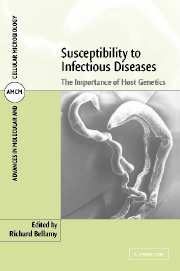Book contents
- Frontmatter
- Contents
- Contributors
- 1 Introduction
- 2 Application of genetic epidemiology to dissecting host susceptibility/resistance to infection illustrated with the study of common mycobacterial infections
- 3 The diverse genetic basis of immunodeficiencies
- 4 Genetic diversity in the major histocompatibility complex and the immune response to infectious diseases
- 5 The cystic fibrosis transmembrane conductance regulator
- 6 The influence of inherited traits on malaria infection
- 7 Polymorphic chemokine receptor and ligand genes in HIV infection
- 8 NRAMP 1 and resistance to intracellular pathogens
- 9 The interleukin-12/interferon-γ loop is required for protective immunity to experimental and natural infections by Mycobacterium
- 10 Mannose-binding lectin deficiency and susceptibility to infectious disease
- 11 Blood group phenotypes and infectious diseases
- 12 Genetics of human susceptibility to infection and hepatic disease caused by schistosomes
- 13 Genetic susceptibility to prion diseases
- Index
- Plate section
1 - Introduction
Published online by Cambridge University Press: 14 August 2009
- Frontmatter
- Contents
- Contributors
- 1 Introduction
- 2 Application of genetic epidemiology to dissecting host susceptibility/resistance to infection illustrated with the study of common mycobacterial infections
- 3 The diverse genetic basis of immunodeficiencies
- 4 Genetic diversity in the major histocompatibility complex and the immune response to infectious diseases
- 5 The cystic fibrosis transmembrane conductance regulator
- 6 The influence of inherited traits on malaria infection
- 7 Polymorphic chemokine receptor and ligand genes in HIV infection
- 8 NRAMP 1 and resistance to intracellular pathogens
- 9 The interleukin-12/interferon-γ loop is required for protective immunity to experimental and natural infections by Mycobacterium
- 10 Mannose-binding lectin deficiency and susceptibility to infectious disease
- 11 Blood group phenotypes and infectious diseases
- 12 Genetics of human susceptibility to infection and hepatic disease caused by schistosomes
- 13 Genetic susceptibility to prion diseases
- Index
- Plate section
Summary
Patients suffering from a serious illness frequently ask “Why did this happen to me?” When the disease is cancer or cardiovascular disease, patients recognise the risk of inheriting “bad genes” from parents as readily as the risks from smoking and diet. It is all too clear that if both our parents suffered myocardial infarcts at an early age we must be at increased risk of the same thing happening to ourselves. However, when asked why someone developed a serious infection, we generally blame lack of acquired immunity, environmental factors, or bad luck. Increasingly it appears that “bad luck” really means the genes we have inherited.
It is a common misapprehension that our genes are not important in determining our ability to fight off infectious diseases. In fact a study of almost 1,000 adoptees in Denmark found that the host genetic component of susceptibility to premature death from infection is greater than for cancer and cardiovascular disease (Sorensen et al., 1988). This is not unexpected as common diseases which cause high mortality exert the greatest evolutionary effects on the human genome. Prior to this century infectious diseases were the major cause of death in the western world and still are in many developing countries. From this we can surmise that microorganisms have been the major selective force in recent human evolution. In other words the interaction between the genes of our ancestors and those of human pathogens have resulted in what makes each of us genetically unique today.
- Type
- Chapter
- Information
- Susceptibility to Infectious DiseasesThe Importance of Host Genetics, pp. 1 - 6Publisher: Cambridge University PressPrint publication year: 2003

